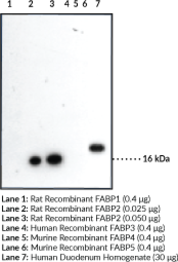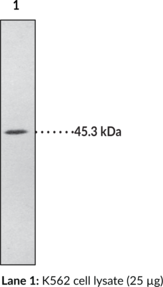Description
Fatty acid binding protein 2 (FABP2) is one of nine known cytosolic FABPs ranging in size from 14-15 kDa containing 127-133 amino acids.{11979} Members of this protein family exhibit high affinity for small lipophilic ligands and were named according to the tissue from which they were initially isolated. Studies suggest that FABPs are involved in the uptake and metabolism of fatty acids, in the maintenance of cellular membrane fatty acid levels, in intracellular trafficking of these substrates, in the modulation of specific enzymes of lipid metabolic pathways, and in the regulation of cell growth and differentiation.{11977} FABP family members have highly conserved three dimensional structures and 22-73% amino acid sequence similarity. FABP2 is composed of ten antiparallel β strands that form a barrel that binds ligand in a bent conformation. FABP2 polymorphism has been suggested to be associated with gender specific obesity and increased risk of diabetes.{11979} Cayman’s FABP2 Polyclonal Antibody can be used for western blot applications. The antibody recognizes FABP2 at 15.207 kDa from human and rat samples.
Synonyms: Fatty Acid Binding Protein 2|I-FABP|Intestinal-Fatty Acid Binding Protein
Immunogen: Synthetic peptide from an internal region of human FABP2
Formulation: 500 μl of peptide affinity-purified IgG
Isotype:
Applications: WB; other applications not tested
Origin: Animal/Rabbit
Stability: 365 days
Application|Western Blot||Product Type|Antibodies|Polyclonal Antibodies||Research Area|Cardiovascular System|Lipids & Lipoproteins|Storage & Transport||Research Area|Endocrinology & Metabolism|Metabolic Diseases|Diabetes||Research Area|Endocrinology & Metabolism|Metabolic Diseases|Obesity


